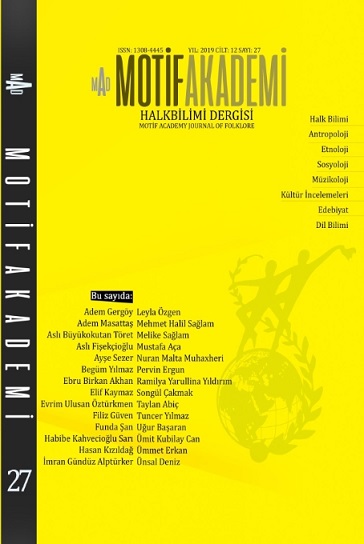EVLİLİK VE MÜLKİYET TEMELİNDE İCAT EDİLMİŞ BİR HALK HUKUKU UYGULAMASI
A PRACTICE OF FOLK LAW WHICH WAS INVENTED ON THE BASIS OF MARRIAGE AND OWNERSHIP
Author(s): Mustafa Aça, Melike SağlamSubject(s): Cultural history, Customs / Folklore, History of Law, Oral history, Social history, Sociology of Law
Published by: Motif Halk Oyunları Eğitim ve Öğretim Vakfı
Keywords: Trabzon; folk law; ownership; marriage; oral history;
Summary/Abstract: To head mostly towards oral history narratives becomes state of necessity in the way for process and practices of traditional folk life to be followed under chronologic course. A lot of components of folk life, such as practices of folk (public) law, which have not registered due to their informal quality, are able to be determined from primary oral sources as well as detecting in the form of the anonymized narratives. During processes of following of folk life, not only general and regional representations can be encountered but also local ones of which following-up is possible in far more limited area. As a matter of fact, taking over-property (ownership) based marriages which constitute heart of this study had been practised till the late 1920s at some settlements connected to today’s Of and Hayrat districts of Trabzon city. During periods when traditional life and the extended family model are prevalent, in addition to the fact that women who spouse had died are forced to the marriage by members, who have already been married, of powerful families for the purpose of taking over property, taking over the abandoned (become ownerless/unclaimed) property by powerful families through symbolic actions constitutes fundamental problem of this study in invention aspect. Oral history narratives which contain examples of both cases were handed down new generations over experiences and narratives of primary sources who have not lived today, and they gained anonymous character in time. Narratives constituting population of article were determined from old-aged source persons at some settlements connected to Of and Hayrat districts by way of using methods and techniques of field study. In this study, the fact that taking over-property based marriages and actions-for laying claims (ownage) to the ownerless property have become an indigenous folk practice by legitimizing over tradition and belief arguments was discussed through dimensions of culture/tradition invention and social history.
Journal: Motif Akademi Halkbilimi Dergisi
- Issue Year: 12/2019
- Issue No: 27
- Page Range: 501-515
- Page Count: 15
- Language: Turkish

